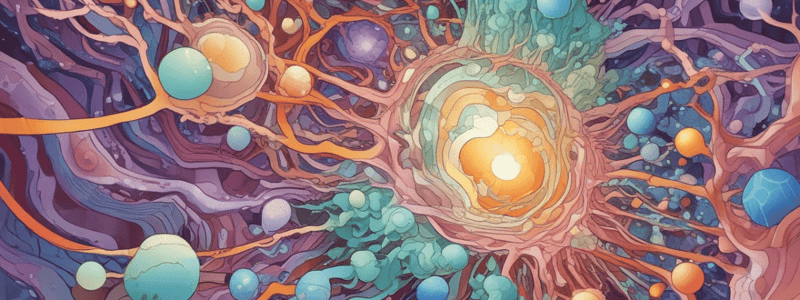Podcast
Questions and Answers
Which enzyme is responsible for the conversion of pregnenolone to progesterone in the zona glomerulosa?
Which enzyme is responsible for the conversion of pregnenolone to progesterone in the zona glomerulosa?
- 17α-hydroxylase
- 18-hydroxylase
- 3β-hydroxysteroid dehydrogenase (correct)
- 11β hydroxylase
What is the role of 21-hydroxylase in the synthesis of aldosterone?
What is the role of 21-hydroxylase in the synthesis of aldosterone?
- Hydroxylates corticosterone at the C18 position
- Hydroxylates progesterone at the C21 position (correct)
- Converts pregnenolone to progesterone
- Converts 11-deoxycorticosterone to corticosterone
Which mitochondrial enzyme causes the hydroxylation of corticosterone at the C18 position in the zona glomerulosa?
Which mitochondrial enzyme causes the hydroxylation of corticosterone at the C18 position in the zona glomerulosa?
- 11β hydroxylase
- 3β-hydroxysteroid dehydrogenase
- 21-hydroxylase
- 18-hydroxylase (correct)
What is the final product of the mineralocorticoids synthesis in the zona glomerulosa?
What is the final product of the mineralocorticoids synthesis in the zona glomerulosa?
After which conversion does 11β hydroxylase act in the mineralocorticoids synthesis pathway?
After which conversion does 11β hydroxylase act in the mineralocorticoids synthesis pathway?
Which of the following is NOT a substrate or intermediate in the aldosterone synthesis pathway?
Which of the following is NOT a substrate or intermediate in the aldosterone synthesis pathway?
Flashcards are hidden until you start studying
Study Notes
Mineralocorticoids Synthesis
- Mineralocorticoids synthesis occurs in the zona glomerulosa.
- The most potent mineralocorticoid produced is aldosterone.
- The synthesis of aldosterone involves four steps:
Step 1: Conversion of Pregnenolone to Progesterone
- Pregnenolone in the smooth endoplasmic reticulum is converted into progesterone.
- This conversion occurs due to the absence of 17α-hydroxylase enzyme in zona glomerulosa.
- The conversion is facilitated by two enzymes: 3β-hydroxysteroid dehydrogenase (3β-OHSD) and 5'4 isomerase.
Step 2: Hydroxylation of Progesterone
- Progesterone is hydroxylated at the C21 position by the 21-hydroxylase enzyme.
- This forms 11-deoxycorticosterone (DOC).
Step 3: Formation of Corticosterone
- DOC leaves the smooth endoplasmic reticulum and enters the mitochondria.
- In the mitochondria, DOC is subjected to hydroxylation at the C11 position by the 11β hydroxylase enzyme.
- This forms corticosterone.
Step 4: Formation of Aldosterone
- In the zona glomerulosa, corticosterone is hydroxylated at the C18 position by the 18-hydroxylase (aldosterone synthase) enzyme.
- This forms aldosterone.
Studying That Suits You
Use AI to generate personalized quizzes and flashcards to suit your learning preferences.




